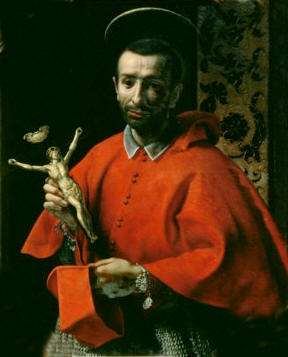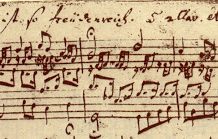The memorial of Saint Charles Borromeo (1538-1584) commemorates one of the great pillars – along with Saint Robert Bellarmine, Philip Neri and countless others – of what is unfortunately known as the ‘ Catholic Counter Reformation’, as though the Church were resisting the ‘true reform’ of the revolutionaries Luther, Calvin, Zwingli, Knox and all the rest of them, most of whom, with what level of knowledge and culpability known only to God, were apostate priests and heresiarchs bent on undermining the very foundations of Christendom. There was not much spirit of ecumenism in the 16th century; antagonisms ran deep, and these would exacerbate later in their spiritual descendants and heirs.
But the true ‘Reformation’ was really the vigorous response of the Catholic Church – which had grown complacent, complaisant and enervated in the luxury and excess of the renaissance – to the Protestant’s own reaction against this worldliness, but in so doing throwing out much of Tradition and truth. Luther and company’s hatred of the Sacrifice of the Mass and the papacy is really something to behold, and makes one ponder.
Charles – or Carlos, as he would have been known – in his relatively brief life filled more than most men in three lives. He was one of the rather rare good fruits of ecclesial nepotism, being none other than the Pope’s nephew, from a noble family lineage. Said Pontiff, Pius IV, recognizing the qualities in the young Charles, then but 22 years old, appointed him a cardinal in 1560. This was back in the days when that office went along with much political power, riches, largesse, and, if one so desired, a life of ease and comfort, even scandal and vice.
Numerous other nepotistic ‘cardinal-nephews’ had chosen to immerse themselves in all of this, but Charles chose the very opposite, dedicating himself to his sacerdotal and ecclesial vocation with an extraordinary zeal to the true Reformation of the Church of Christ. He promoted austerity and discipline amongst the clergy, as well as piety and learning, leading always by example. And it was Cardinal Borromeo who, almost by sheer force of his own will, intellect and holiness, brought the third and final session of the great Council of Trent (1545 – 1563) to an admirable and glorious conclusion, which clarified and solidified the Church’s doctrine and practice, right up to our modern era.
Charles was ordained a priest in 1563 (cardinals up until quite recently could be, and sometime were, laymen), and was appointed Archbishop of Milan a year later, in 1564. The new Bishop saw that the Protestants did have a point, for the Church was in many respects in a sorry state, with too many bishops, priests and religious promoted too quickly, unprepared for their duties, and descending into dissolute, if not outright scandalous, lives.
His reforms in Milan met with much resistance, even an attempt on his life by some rebellious Franciscans. But Charles was resolute, putting into practical effect the reforms called for by the Council – he was one of the primary authors of the Roman Catechism, and the main force behind the setting up of seminaries, with their disciplined formative and academic program for the training of future priests and bishops. It was Charles who insisted on the teaching of Saint Thomas Aquinas, still enforced by the Second Vatican Council.
By his diplomacy and numerous writings, he helped guide the Church in his own tumultuous time, not least the troubled state of the Church in England – see the bitter fruits of Henry’s Oath of Supremacy in yesterday’s post. Cardinal Charles carried about pictures of his fellow Cardinal, John Fisher, along with Thomas More, both recently martyred, to whom he was greatly devoted. Edmund Campion, the great Jesuit and future martyr, stayed with Bishop Borromeo for eight days of prayer and conversation, before his fateful return to England, and, ultimately, his own martyrdom.
The Cardinal’s advice to his priests stands in good stead for us all:
Would you like me to teach you how to grow from virtue to virtue and how, if you are already recollected at prayer, you can be even more attentive next time, and so give God more pleasing worship? Listen, and I will tell you. If a tiny spark of God’s love already burns within you, do not expose it to the wind, for it may get blown out. Keep the stove tightly shut so that it will not lose its heat and grow cold. In other words, avoid distractions as well as you can. Stay quiet with God. Do not spend your time in useless chatter.
‘Stay quiet with God‘ is invaluable advice in our technological era of constant noise and distraction, counsel reiterated powerfully and providentially for our own day by another saintly cardinal, Robert Sarah, whose book on the Power of Silence, along with his and Benedict XVI’s meditation on priestly celibacy, come highly recommended.
Charles Borromeo was the patron and intercessor of a future bishop who carried his name, Karol Wojtyla. Young Karol invoked the prayers of his predecessor, and celebrated this day, for in Polish culture, the focus is on one’s patron saint by name, rather than one’s birthday. Their lives in many ways were parallel, both bishops and reformers of the Church in the tumultuous days after a significant Council.
Bishops Wojtyla and Borromeo were both great saints, stalwart and steadfast in their defence and safeguarding of the Church’s salvific truths, clearly, without ambiguity and compromise. They had sought a life in the ‘lowest place’ hidden with God (young Karol at first desired to be a Carthusian, and we may be thankful that his spiritual director convinced him otherwise). Both were brought up to the highest ranks of the Church, by the grace and providence of the same God, and we should pray that all of our pastors, bishops and priests imbibe some large share of their spirit of dedication, magnanimity and holiness, so that a true reform in our own day may take root, and bear much fruit.
The following excerpt offers an enlightening window into an episode in the life of our saint and his heroism during an outbreak of the plague. Saint Charles offers a noble example of how a bishop and priest, as well as secular leaders, should respond in times of crisis:
Saint Charles Borromeo fell ill during a retreat in 1584, worn out by his labours, and died on November 3rd, at the young age of 46. He spent his life for souls and God’s holy Church, and would that we all – bishops, priests, religious and laity – had some small spark of his zeal. Ora pro nobis!












